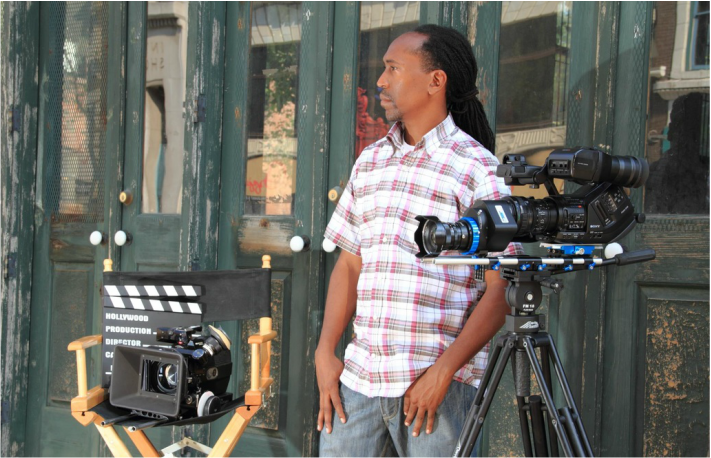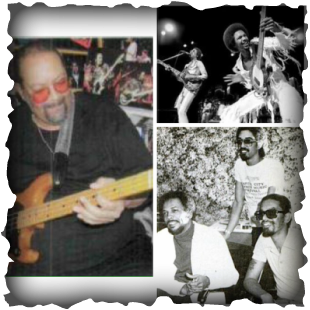
Describe your duties and when did you get started? I direct, shoot, edit, produce and cast for film, TV, commercials and video productions. I got interested in my craft back in 1995 and have been professionally doing it since 1999.
When did your "Aha" moment transpire and you knew this is what you wanted to do for a living? The one moment where I knew that I could make a living off my talent was when I was shooting behind-the-scenes footage for Nelly and the St. Lunatics. I was just casually talking with two record label reps about how the chemistry of the group really works and their roles as a unit. I went on to say that they should do a video of some sort, highlighting how the group members were and give the video out with the album. The label reps loved the ideal and had me write it all out and submit an invoice. When they cut my deposit check and flew me out to L.A. a month later, I knew this was it.
When did you first take an interest in this kind of work? When I went to Prairie View A & M University, I filmed the Kappa (Alpha Psi Fraternity) beach party. This was my sophomore year and that's when I realized, going into my junior year, I wanted to change my major from architecture. I only did a half semester there before deciding to come back home to finish up college at Webster University.
What training and/or educational background do you have? I was volunteering at a local television station where the music video show I was a part of, Phat Clips, was being produced. I was getting on-the-job training in a real environment while studying for my bachelor’s degree in media communications at Webster University.
Since graduating from college, you've only worked for yourself. What are the pros and cons of being the boss? I’m blessed to work for myself, coming right out of college and going into the field where I got my degree. The main pro and con is a catch 22. I create my own destiny, which means the financial gains are endless. However, with the line of work that I do, it may not always be in high demand, which means finances can be somewhat limited.
What keeps you going when the grind gets tough? Have you ever thought about throwing in the towel to get a nine-to-five job? What keeps me going when the grind is tough is just my spiritual connection to the world and the positive feedback I get from clients and the people that follow my work. I never really thought about quitting, because I know this is my true calling; however, at times I have questioned if the path I’m taking is in vain. When this happens, usually I get a sign that says I have to keep going with the flow. For example, I have literally been down to my last project, with nothing in sight, and the phone rings. Then I’m back swamped with work. It’s a crazy approach that I wouldn’t recommend but that’s how I know I’ll be fine.
Tell me more about the video show? How did it help St. Louis musically? I was a fan of a local hip-hop music video show called Phat Clips. When I decided to return home and finish my degree, I contacted the show’s producer at the time to see if he needed help. Luckily, he did. I was like a sponge and spent over 20 to 30 hours a week at the studio. Now this is when I was taking a full-course load in college and working a part time job. The show was dedicated to showcasing the newest and underground hip-hop music videos. Phat Clips had a huge following to the point where almost every major artist that came to St. Louis had to be on the show. I’m talking about Public Enemy, Nas, Outkast, Eminem, The Black Eyed Peas, Lil Kim, etc. I was an aspiring rapper at one point (and don’t ask me to rap), so I felt that if I had an outlet, I would be able to highlight my group and other artists. Well, I lost the desire to rap and became focused on who in St. Louis was worthy to be featured on the show, and that’s when I started showcasing certain acts in the Local Clip of the Week section of the show. The biggest names that came from me doing so were Nelly and the St. Lunatics and Chingy.
Acclaimed video director and photographer Marc Klasfeld became your mentor. How did this happen and what did you learn from him? Marc Klasfeld was one of the premiere music video directors at the time; he was known for capturing rappers Juvenile, Jay-Z and Ludacris. What made him special was that he was able to film artists in unique and creative settings. I connected with Marc the same way I did with the label reps I told you about earlier. I was actually filming the documentary for the St. Lunatics at one of their music video shoots. Marc was there directing and we started talking about music videos in between takes. I was breaking down his whole style of shooting and I assumed he was impressed with that, because I got a call from a music video producer, saying I was referred by Marc to be the casting director for an upcoming video Marc would be directing in St. Louis. I was excited yet nervous because I never put together a casting before. It was learning on the job 101, and I was honest with Marc about not knowing how to do this, but he believed in me because 1) I understood his style and 2) I knew a lot of people. I eventually went on to cast over 20 major music videos and productions. But my biggest influence would be my sister Margena Christian, which happens to be you, because you led by example and proved that being passionate about your dreams will eventually pay off.
What was your first big video that signaled your ‘break’? The first big video that helped gain some buzz was the Chingy Balla Baby Remix video. It hit No. 1 on BET’s 106 and Park Countdown and eventually was retired after being on the show for so long. That was cool to see my name in the credits on TV.
You grew up around celebrities and going to concerts. What was the first show you recalled attending? The first concert I ever attended was at the Fox Theatre. It was the New Edition concert featuring The Fat Boys and U.T.F.O. Back then artists did two shows, a matinee and evening performance. I attended the matinee show with my sisters. It was a cool experience aside from my parents making me wear a brown suit with Hush Puppy shoes when the other kids at the concert were wearing polo shirts, Levis and Converse sneakers. I remember later going to the BBD concert. Johnny Gill and Keith Sweat also performed. In 2011, I ended up directing three Johnny Gill music videos, which were part of a trilogy: Just The Way You Are, It Would Be You and Second Place. It was two sample songs and one full-length song. I decided to tell a story and connect all three.
What companies have you completed projects for? I’ve done work with Universal Records, Capitol Records, Pepsi, Red Bull, Jack Daniels and VH-1. I think the most relevant projects I have done to date, just due to where we are at in society, are two PSAs for the Martin Luther King Memorial Foundation. I directed and filmed Cedric the Entertainer and Nelly for the PSA spots to help raise money for a memorial of Martin Luther King on the mall in Washington D.C. It feels good to know that I had a hand in contributing to something so historic.
Do you find that it's a struggle to get people to take you seriously, coming from St. Louis, not necessarily considered a hot-button place for entertainment like New York or Los Angeles? Yes. It’s a bit of a struggle to get people to recognize that St. Louis has tremendous talent. But I’m an activist in the sense that I want people to know that I don’t have to leave home to go to Hollywood; I want to bring Hollywood to my home. You have directors like Spike Lee and Woody Allen that made a living doing films centered around their hometown. I want to do the same. I understand that I’m in a position to change lives for people, whether it’s giving an aspiring actor a part in a commercial, giving a lighting guy a job on a music video or filming a scene for a reality show at a local eatery. I want to be able to make an economic difference as well as a creative difference in my community.
DocM.A.C signing off. Keep the faith and always trust the process. #OnwardUpward

 RSS Feed
RSS Feed